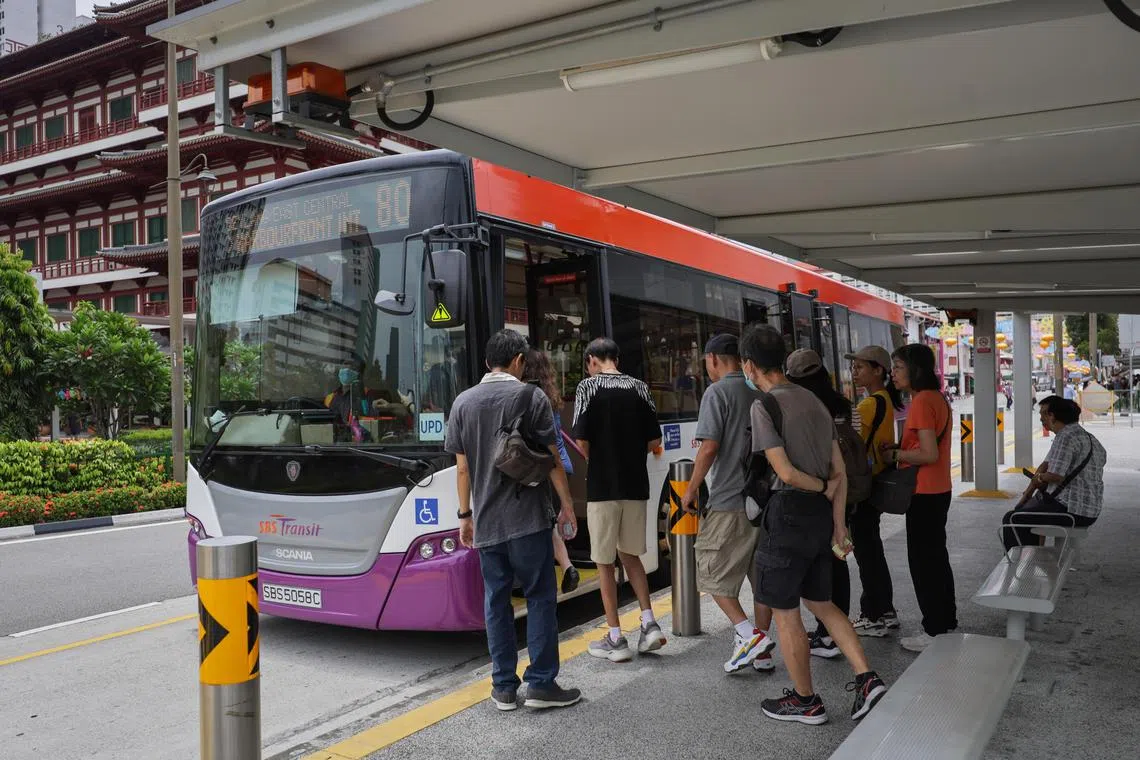Bus safety task force will tap foreign expertise to find best practices for Singapore
Sign up now: Get ST's newsletters delivered to your inbox

The task force aims to complete its review by the first half of 2025.
ST PHOTO: GIN TAY
Follow topic:
SINGAPORE - A task force formed to scrutinise the safety of public buses here will engage international experts, regulators and operators in the coming months to identify suitable practices that Singapore’s public bus sector can adopt, Minister of State for Transport Murali Pillai said in Parliament on Nov 13.
The task force aims to complete its review by the first half of 2025, Mr Murali told the House. Transport Minister Chee Hong Tat previously said the group – announced on July 1 after a spate of accidents involving public buses
So far, the task force has engaged with experts from Australia, South Korea and the United Kingdom. It will continue to talk to overseas regulators and operators in the coming months, the Ministry of Transport told The Straits Times.
Mr Murali, who is leading the task force, gave an update on its progress, in response to a question from Mr Saktiandi Supaat (Bishan-Toa Payoh GRC).
Mr Saktiandi, who chairs the Government Parliamentary Committee for Transport, had asked about the task force’s key focus areas and to what extent it has engaged various parties to improve safety.
Mr Murali replied that between July and October, the group had spoken to passengers, road users, bus captains and other public transport workers to obtain feedback on how to improve bus safety.
This included a month-long survey that gathered more than 2,300 responses from the public, a survey of bus captains that drew over 3,400 responses, as well as in-person focus-group discussions with around 160 passengers and road users.
The task force also visited all four bus operators to understand their safety practices and held discussions with bus captains to grasp their concerns and challenges.
The four operators are SBS Transit, SMRT Buses, Go-Ahead Singapore and Tower Transit Singapore. In all, they operate about 5,800 public buses.
Based on the feedback received so far, Mr Murali said passengers generally feel that the safety standards on board buses are good.
“But of course, there are always areas that we can look at to enhance these standards,” he added.
Dr Tan Wu Meng (Jurong GRC) later rose to call attention to the needs of elderly passengers.
He asked Mr Murali whether the task force would engage healthcare professionals, such as geriatricians, physiotherapists and occupational therapists, who work with the elderly and may have insights into the challenges they face.
Replying, Mr Murali said that so far, the task force has heard from seniors who use public transport and bus captains who have engaged with seniors.
One area of concern is how to deal with situations where a bus has to decelerate quickly, which may cause problems for seniors. This, he added, is one area that the task force is looking into.
The other challenge is dissuading seniors with mobility issues from going to the upper deck of double-deck buses “so that they don’t take any chances while climbing up”. That requires some level of education, said Mr Murali.
The task force comprises representatives from government agencies, the National Transport Workers’ Union, the four public bus operators, and the Singapore Road Safety Council.
Before its formation was made public, at least five accidents involving public buses took place in June.
Mr Murali said the number of serious accidents involving public buses has remained stable over the past few years, and this has remained the case since the task force was announced in July.
There were 75 such accidents in the first five months of 2024, compared with 207 each in both the whole of 2023 and 2022.
In 2023, 3.75 million public bus rides were taken daily on average.


